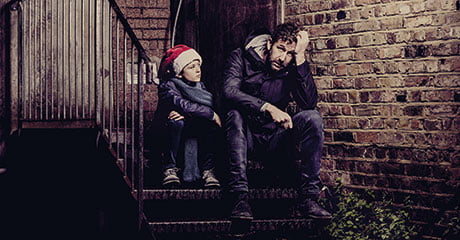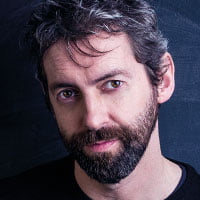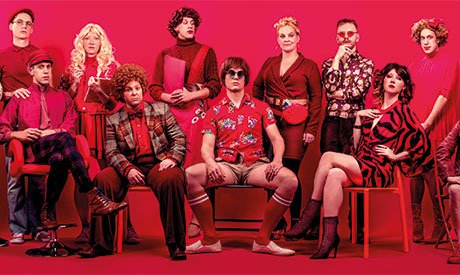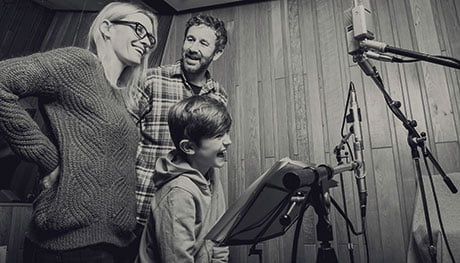Pod almighty
The rise in popularity of podcasting apparently knows no bounds. Clive Whittingham reports on how to get your own work to stand out in a crowded marketplace and discovers the key to adapting pods for television.

Baby It’s Cold Outside looks at homelessness in the UK
The content industry has fawned over 3D, ultra HD and virtual reality and is now increasingly led by streamers and OTT players. Technology, we’re told all the time, is changing the game. And yet the part of the market burning brightest is arguably podcasting. “We’re in an age of technological advancement that’s further along than anything else in history, and the hottest thing in the world right now is, literally, radio,” says Brett-Patrick Jenkins, head of development and senior VP at US prodco Propagate.
According to agent Marissa Hurwitz, who has helped Christopher Goffard’s Dirty John podcast move to a true crime drama series with Bravo and Netflix as part of her role at WME, there are several factors behind the boom. “Podcasts are available for free, the app is on every iPhone and it’s one of the ones you can’t delete. Serial was a key moment drawing attention to the space,” she says.
“Podcasting has a much lower entry barrier than television. For producers who have ideas and passion projects, podcasting is a great place to experiment and figure out what has legs while at the same time being able to monetise it through advertising.”
Another benefit over TV is in the quick turnarounds. Robert Delamere, who launched Fremantle’s dedicated scripted podcast label Storyglass in November last year, points out that its first project, Baby It’s Cold Outside, developed with Fremantle-owned Duck Soup Films, took five months to come to air while feature film The Favourite, starring Oscar winner Olivia Colman, took 15 years. “There’s something about the immediacy of the form that gives it interesting potency at the moment,” he says.

Rob Delamere
But in a market where every TV show, unsolved crime and even lower-league football club has multiple podcasts, how do you cut through and monetise your version?
Stuart Coxe, the president of Entertainment One’s podcast network and the man behind hit podcast Sickboy, says tactics for monetising the medium are varied but companies should beware thinking A-list talent equals A-star results in pods. “Maybe you’re doing it because you want a book deal, maybe you’re doing it so you can live-tour, maybe you just want a TV show, or maybe you want to be so popular you make money in ad revenue.
“It’s wrong to think that because somebody is big they’ll be a good podcaster and cut through. People love podcasting because they want to hear passionate voices – they smell somebody who is faking it. If it’s a celebrity they’ve got to be doing it for passion.”
True crime podcasts have been big business so far, led by the boom in the genre’s popularity after Making a Murderer on Netflix and The Jinx on HBO, and also by Serial in podcasting. One break-out hit was Up & Vanished, about a cold case involving a missing teacher in Georgia, which has had more than 280 million downloads and is being made into a series by US cablenet Oxygen.
Donald Albright, co-founder of Tenderfoot TV, said he co-created Up & Vanished with its host, Payne Lindsey, specifically to get a television series. “We knew that navigating from the music videos I was producing to film or TV would take a lot of money and connections, so the low-hanging fruit was podcasting,” he says. “We learned the podcast business as a route into TV. We didn’t think it was a business by itself at first but ours steamrollered from 5,000 downloads in the first week to 50,000 the next, and then after a huge break in the case it sky rocketed to 50 million a month.
“We can produce an entire season of 30 episodes for the cost of one episode of television. When Coca-Cola advertises on Oxygen we don’t get a cut of that sale, but it’s the opposite on the podcast side, where our reps can deal directly with the brand.”
This boom has inevitably sent traditional television producers scurrying towards a potential new source of valuable IP, but with so much to choose from and the more obvious and successful pods snapped up by prodcos in double-quick time amid fierce competition, what’s the key to success?

The cast of Storyglass podcast Who Exploded Vivienne Stone?
Hurwitz at WME says: “On the producer side it’s about checking out not just Apple’s top podcast but really trying to find the other shows that aren’t sitting in the top 10. There is so much interesting content to be found below that list and it’s about finding that new interesting piece of IP.”
Jenkins at Propagate optioned Up & Vanished and took the show to Oxygen, and works on the adaptation of Lore, which explores the truth behind non-fiction horror stories, for Amazon. He adds: “There’s rarely a break-out show on television that doesn’t have something unique and different about it. As programmers, buyers, distributors, it’s easy for us to lock on to a formula and repeat it. In the podcast space there are new voices, people taking risks who didn’t come up through traditional Hollywood networks and are able to penetrate and excite audiences through being different. I hope buyers see that too.
“We look at books, webisodes, I trawl Twitter every day trying to find stuff. Lore was really the first big podcast sale and I found that show by looking on Twitter. It had just come out, host Aaron Mahnke was still working part-time at a drug store, now he’s a multi-millionaire. We will see networkers, streamers and cablers investing more money in adaptations. That’s smart as more people switch to streamers you want those audiences to come to you and have awareness of your network and brand identity.”
And for podcasters who find themselves with a hit on their hands, and a sudden deluge of interest from producers wanting to option the adaptation, how do you maximise your show’s potential?
“The talent we represent gets tonnes of reach-out from networks who want to represent the IP and it’s important to take a step back and decide on the strategy,” Hurwitz says. “You have to package the project and make sure you get the best sale for them possible.” With Dirty John, the package put together to get it away was a scripted series with Connie Britton (Friday Night Lights) attached to star and Lisa Cunningham (Desperate Housewives) in as writer. An unscripted doc series followed on Bravo’s sister net Oxygen. “It’s about what the whole package is behind the initial elevator pitch,” Hurwitz says.
Although Fremantle has tried to bypass the arms race by setting up its own podcast production label to work with the prodcos under its umbrella, Delamere, who runs it, says podcasters need to avoid a common pitfall. “Your podcast needs to be effective in the podcast space, it can’t be a trial run for TV IP,” he says.

Baby It’s Cold Outside in the studio
Storyglass is focusing exclusively on scripted podcasts for now and will unveil a slate of projects in May following Baby It’s Cold Outside and the upcoming Who Exploded Vivienne Stone?. “We’re looking at eclectic tones, from supernatural thrillers to anarchic comedy,” says Delamere. “We didn’t want to get lost in a crowded true crime or true story world because there’s a bigger opportunity here in this space given the number of creatives who are coming out of the woodwork to talk about podcasts.
“Fremantle is very successful in the global drama business with American Gods, Young Pope, My Brilliant Friend and others. There was a feeling this was a great opportunity and we’re set up to take them further into television if we wanted to. There is a huge range of global opportunities – we’re talking to people from film companies in New York, filmmakers in South Africa, producers in Australia. The explosion of podcast feels very broad and is affording everybody an opportunity.”
Hurwitz cites six-part sci-fi podcast Gay Future, where everybody in the world is gay and it’s down to one closeted straight guy to save the world, as an example of the talent around and wants to turn that scripted podcasting dial still further. “Comedy sitcom podcasts are an area ripe for development,” she says.
As for further progression, Albright is eyeing technological advances as he prepares his next move. “Some ideas we want to do we can’t yet because podcasting is operating on 20-year-old technology,” he says. “We’ve discussed an interactive podcast where people listening on a smart speaker can direct it this way or that. We’re developing ideas for stories that, when the technology is ready, will take podcasting to the next level.”
Content’s hottest medium could be about to turn its temperature up still further.
















.jpg)




























